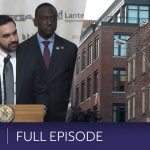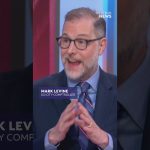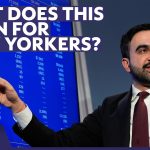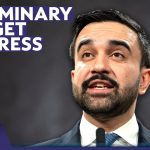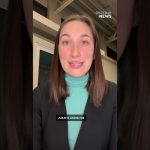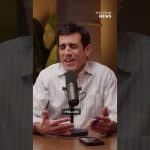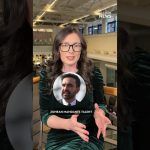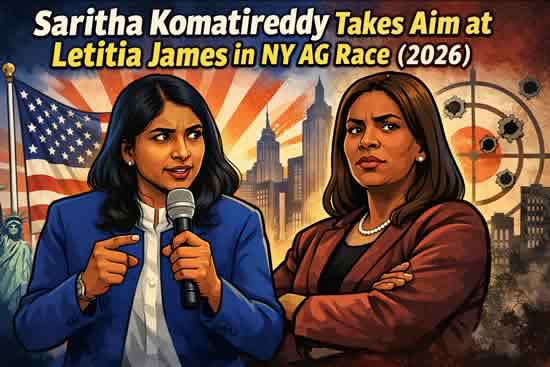First Deputy Mayor Maria Torres-Springer: Good morning, everyone. Thanks to all of you for being here. My name is Maria Torres-Springer. I’m the first deputy mayor for the City of New York, and I’m so excited to be joined by colleagues and partners across the administration as we celebrate yet another year where the mayor and our administration secured landmark wins on issues that matter most to New Yorkers.
Keeping people safe, connecting New Yorkers to affordable homes, and putting money back into their pockets. I’m proud to say that we have delivered in unprecedented and record-breaking ways. Now, the people of this city, they expect us to get stuff done for them every single day, and we have done just that throughout 2024. So to share more about this year’s accomplishments and what it means for our great city, please join me in welcoming the 110th mayor of New York City, Mayor Eric Adams.
Mayor Eric Adams: Thank you. Good morning. Good morning, New York City. And really, thank you, First Deputy Mayor Maria Torres-Springer, and all of these commissioners, and the chancellor, and this entire amazing team. We see the lights are on, the snow is removed, law enforcement continue to do their job, but we don’t often see the faces behind the team, the coaches, those who make sure we’re prepared to move this city forward. And so we want to thank everyone for joining us this morning, and you know, give yourselves a hand, because it’s an amazing group of New York men and women.
As soon as you hear something happens in the city, I think of the commissioner. I thought of you the other day with that water main break. You know, if there’s a shooting, I think of Commissioner Tisch. If there’s something in the school, I think of [the] chancellor. We pick up the papers, or we hear an announcement, and I see the faces of those who are responding to these incidents 24 hours, seven days a week. In 2024, our administration continued just to get stuff done for New Yorkers.
And the first deputy mayor was right. Those things that New Yorkers are concerned about, we know what they’re concerned about because of the over 30-something town hall[s], senior town halls, youth town halls. We’re hearing directly from New Yorkers, and we see and hear their concern, especially when it comes to creating a safer, more affordable city.
This year, we continue to drive down crime. An amazing job by those who wear the blue uniform every day, and the other law enforcement agencies that play a role. We created more jobs, more housing, and more opportunity for, wait a minute, wait a second. We’ve done this presser every year, year after year after year, and people don’t get to see the visualization of more accomplishments, more milestones, more wins for our city. So this year, we’re going to do things a little differently. Instead of just GSD mean getting stuff done, and you can’t have another meeting at the same time, this year, we’re going to get [the] scroll down. Give me that.
Sometimes when you’re in the midst of it, you don’t even understand how much you have done. We have so many extraordinary accomplishments from the past year that we literally filled the rotunda with them. And those team members who sat at desk every day, who responded to ACS calls, who responded to 911 calls, those members who sat in classrooms and taught and educated young minds, the entire 300,000 plus men and women who have given their all to make these accomplishments behind us.
Because of their efforts, overall crime continued to go down again. This year, we drove shootings down by nearly 7 percent. And that’s after major decreases last year and year before that. Homicides are down over 7 percent after massive declines over the last two years. And subway crime is down by 6 percent. We seized more than 6,000 illegal guns in 2024 alone, taking the total guns off our streets at the level of almost 20,000, 19,600. And we drove grand larceny down, auto, for 12 straight months in a row, thanks to our crackdown on car theft. Safer streets and subways are just the start.
We cut lithium-ion battery fire deaths by 72 percent since 2023 with our Charge Safe Ride Safe plan. We’re leading the nation on these initiatives. We shut down more than 1,300 illegal cannabis and smoke shops with Operation Padlock to Protect. Great job, Sheriff Miranda. And removed over 73,000—let that number settle in— 73,000 ghost cars and illegal vehicles like ATVs since 2022. We’re making the safest big city in America even safer. And when I think about 2024, the word that comes to mind is record.
We broke records for the most jobs in our city history, the most small businesses in our city history, the most new homes financed in city history, and so much more. These are landmark achievements, so let’s break them down one by one.
Just a few weeks ago, we passed our historic City of Yes housing agenda. The mission accomplished [by] Dan Garodnick and his team, FDM, Tiffany Raspberry, Intergovernmental Affairs and her entire team. We put us on a path to 80,000 new homes for New Yorkers and invested $5 billion in housing and infrastructure. We have shattered affordable housing records two years in a row. The commissioner, HBD, has really had a team that moved this agenda forward. Where’s Adolfo? Great job, Adolfo. And, you know, this number is so significant because people often miss it because it is homeless crisis is a real crisis that’s national as well as local.
We moved a record of 18,500 households from shelter into stable homes. Molly is around. Commissioner Park. And we put money back in the pockets and we did just that. And we did just that. We launched our Money in Your Pocket initiative to connect New Yorkers to the many different services that save them money and built on the $30 billion we’ve already put back into the pockets of working class, low-income New Yorkers.
For the first time in city history, we extended 3K offers to every family who applied on time and enrolled 150,000 kids in our early childhood education system. This was never done before. But you know what? We did it. We expanded the New York City Earned Income Tax Credit and gave $345 million back to New Yorkers. And to deliver even more tax relief, we traveled to Albany and lobbied for our Axe the Tax for the Working Class. And we received support thanks to Assemblywoman Rodneyse Bichotte Hermelyn and Senator Leroy Comrie.
We eliminated and cut– where this is going to eliminate and cut city income taxes for working class families, giving $63 million back to nearly 600,000 New Yorkers. What does that look like? A mother who’s making $31,000 a year, she will now be able to have her personal income tax removed off of her burdens. This is real money for real people with real concerns. And we said we’ll grow the economy. We did. Breaking the job records again and again, and now also have a record 183,000 small businesses across the five boroughs. While our Small Business Opportunity Fund has awarded more than $85 million in capital over 1,000 small businesses. Is Commissioner Gross here? Alright, commissioner. Job well done.
We supported our city’s cultural institution with a $254 million investment in the Department of Cultural Affairs. Where’s Laurie? The largest in the city’s history. That’s right. Largest in the city’s history. And we’ve announced it. We’re announcing that in 2024, New York City welcomed [nearly] 65 million visitors to our city. The second highest number in the history of the City of New York. And every time I see the tourists, I tell them they have one assignment. Leave George Washington here. Spend money. Spend money.
To keep our young people healthy and safe, we deliver free virtual therapy to 16,000 teenagers largely in underserved neighborhoods through our Teen Space Initiative. DOHMH, great job. And sued the companies that own major social media platforms to hold them accountable for fueling the youth mental health crisis.
We are not only investing in public schools, but in public spaces. New Yorkers can see for themselves the vast improvements we have made in our public spaces by finally containerizing our city’s trash, getting sheds down, and creating thousands of acres of new public space. DM, Meera Joshi, you and your entire team, Commissioner Sue Donoghue over at Parks, our public realm director, all the team. In fact, we are on track to build a record number of public spaces, record number of public spaces for pedestrians, including plazas, sidewalk extensions, safety islands, and more. And even more importantly, we’ve just getting started.
One year from now, when we’re all right back here in the Rotunda, we will need an even longer scroll for all the other accomplishments we intend to deliver for you every day, everywhere. But until then, we want you all to have a happy and safe holiday season. And as we show the joy of the holiday season, this is also a time where people go through a high level of depression, suicidal ideations, losing loved ones. It is imperative for us to look out for our neighbors.
Before wrapping that gift for your son, your daughter, your husband, your wife, wrap a gift for a child in a homeless shelter. That young man in the freezing weather that has a windbreaker on, maybe he needs a coat. That young girl who’s wearing sandals instead of shoes during the freezing [winter], maybe they need a pair of shoes. We all can give a little more for New Yorkers. Our job as a governmental entity is to provide for the children and families of this city. We’ve done that record after record after record. This is a successful administration, not only for what we have done, but for what we have overcome from COVID to migrants and asylum seekers to crisis after crisis. We never moved our eyes from our North Star. The children and families of the city. Job well done. Job well done. Thank you very much.
First Deputy Mayor Torres-Springer: Thank you so much, mayor. From day one, the mayor tasked everyone in the administration to not just do the work that is expected of the different agencies, but to really step up and do even more than that. And by that, what I mean is to do the type of work, to perform the type of public service that New Yorkers deserve, because for too long, government has left too many people behind.
And so that has been our mission from day one. And I want to echo the mayor’s thanks to all of the heads of the different agencies who are here today, and especially for all of your teams who continue to serve with purpose, with passion, and with care for all of the New Yorkers who make our city great. And so thanks to all of you. A round of applause again for what you do.
The scroll is long. The list of accomplishments is long. But at the end of the day, it’s not just about what we have accomplished. It’s about why these accomplishments matter. It’s about the New Yorkers who we helped find jobs, housing, child care, and so much more. And that’s why I’m so excited to introduce our next speaker, Allen Pastures. Allen came to one of our many town halls and shared with the mayor his struggles to find housing. The mayor told Alan that we would help him, and that’s exactly what we did. We worked across agencies and offices to make sure that he found a safe and affordable home. People like Allen are why we do this work. It’s why all of these accomplishments matter. And so without further ado, please join me in welcoming Mr. Allen Pastures.
Allen Pastures: Good morning. Hello, people. I just want to let you know, it’s a very short story, but it happened. The Lord had brought me to a town hall where they [were] having an interview, and they was doing something. I went to so many agencies, and it was taking their time getting me housing. I had my cityFHEPS voucher, and I just happened to go to a senior hall, and they was setting up.
And they said, oh, the mayor is going to be here. And I said, oh, really? This is wonderful. I said, so everybody have a topic, and my topic was my cityFHEPS voucher. So I act out, and when I got to that point, I said, mayor, I have my voucher, and no one is helping me. And the next thing I know, they just got on the job, and they [were] able to get me an apartment that I love that is so beautiful.
And I am able—now that I have an apartment, I am able to cook food and give to the homeless and do whatever I can do, because without the mayor, after God, without God and then the mayor, I wouldn’t be here today to speak and say what I have to say. And it’s so wonderful knowing that this agency is here and is doing so wonderful, so many things for those and others. And I want to do as much as I can do as far as giving out food to the homeless. Thank you very much.
Mayor Adams: I hope we didn’t miss what was stated. He went from being homeless to helping the homeless. And when I do those food handouts, you know, on Wednesdays and other nights, we started out, that it was just homeless people on the line and talking to them. And then the lines started getting longer and longer, and we started to see working-class people who needed to get those meals.
And so, if you stay in a sterilized environment of just City Hall, you’ll never really understand what’s happening on the streets. And seeing me handing out that food on those Wednesday nights, those everyday New Yorkers see their mayor that they can talk to and they can speak with. That’s the hallmark and trademark of this administration. We don’t deify ourselves. We don’t believe that we are greater than those we are serving. We are servant leaders. And we engage with people on the ground every day.
That’s how Commissioner Tisch knew about the containerization and some of the trash problems, because she was listening to people over and over again. And DM Williams-Isom, going and visiting those shelters with Zach Iscol and others. This administration, our real trademark, when people get away from just covering us daily to reviewing what we’ve done, you’re going to see an authentic group of New Yorkers that just love this city. And we were not afraid to be among everyday people. You will never be a good shepherd if you are not among the sheep. We’ve been among the sheep throughout our entire three years in this role as this administration. So why don’t we do some more on topics before we bounce?
Question: Mr. Mayor, how do you think these priorities will change, if at all, when President Trump becomes, President-elect Trump becomes president?
Mayor Adams: We’re going to continue. We, in 2021, we had an agenda of public safety, the overproliferation of handguns and crime in our city. I reached out to President-elect Biden. I was able to get him to come visit the city with the police commissioner. He went to our crisis management teams. We were able to get an ATF head, something that we needed to coordinate our gun initiatives.
We lobbied, DM Meera Joshi put an entire team to go after the hundreds of millions of dollars in grant money. We established a relationship to do so. What our skill that we have is our ability to work across the aisle. It shouldn’t matter who is in the White House. New York City is the economic engine of this entire country. And the president has shared with me, he wants to make sure the city is going to be fine. And we’re going to continue to double down on these priorities and get the successes that we believe in. So our goal is to accomplish that. Chief of staff and first deputy mayor, they went to Washington, D.C. They met with both sides of the aisle to say, we have to deliver for New Yorkers. And so these accomplishments should grow no matter who’s the president.
Question: Will there be any change at all?
Mayor Adams: I’m sorry?
Question: Will there be any change, do you think? Any changes in your priorities?
Mayor Adams: Same, consistent. I ran on working class people, public safety. I ran on efficiency in government. Thank God we did the $7.1 or $7.2 billion in PEGs and savings because we were able to handle the crisis of [$6.65] billion with the migrants and asylum seekers.
I ran on government, not leaving New Yorkers behind. We betrayed New Yorkers in the city. And I ran on stopping that betrayal. And so that mission, that’s our North Star. Our North Star is working class people. We’re going to continue with that North Star. How are you, Liz?
Question: You’re obviously standing with some different people in your administration because you have made some changes. I wanted to ask, how has that affected the chemistry of your administration? And also your governing style. Have they made it better? Are there less distractions for you?
Mayor Adams: Every administration, when you go three years deep, you’ll see a change in administration. People come and go. And it’s probably harder for this administration than other administrations. I’m a mayor on steroids, you know?
[Crosstalk.]
You know, I’m a mayor that, you know, figuratively is on steroids. You know, I doubt very much. If you were to interview previous commissioners, I doubt very much that previous mayors would be calling their team at 2 a.m. in the morning and say, why is this encampment here?
I doubt very much they would be calling and saying, why is this garbage can overflow? You know, why is that officer doing X? So, you know, by the time you do three years with me, those are dog years, you know? And as Chancellor Banks stated, he said, I ran out of gas. And so we’ve had those who left because of the constant scrutiny. Because it’s hard being a public servant. It’s hard missing baseball games. It’s hard missing birthday parties. I had dinner with Zach Iscol the other day, he and his wife, and they were sharing just how much it took out of the roles I did during the migrant asylum seekers early in the morning opening locations. And so the synergy is still there.
I came into office, I said, our trademark is going to be social emotional intelligence. And if we don’t have that, if we’re not conscious on how we’re treating each other and how we’re treating our constituency, then we’ll never be successful. And so that social emotional intelligence is still in place. We have some good days. We have some bad days. But the reality is we’re focused on our North Star. No matter what conflicts come up, D.M Williams-Isom has never taken her eyes off of making sure that our children are safe.
You know, no matter what happens in the city and changes of job. Commissioner Tisch went from landmark changes in Department of Sanitation, and she was able to take that manager skill. Now she’s over at the Police Department. That is how good our bench is and how deep our bench is. And there’s going to be more changes that we’re making. But we have a deep bench. We have a dedicated group of people that I started out with, stay focused, no distractions and grind. They now say it. And so all that’s happened around us, all the things that are happening, these folks are not, these folks stay focused.
You know, commissioner of DDC is still doing ribbon cuttings because of what we accomplished. This has been a focused group of people. And when they finish this, all the stuff we’ve gone through, when you finish this, there’s nothing you can’t do. We personified if you can make it here, you can make it anywhere. If you can make it in Adam’s administration, you can make it in any administration.
Question: Mr. Mayor, on the homeless outreach you mentioned, maybe it’s a question for you or the DSS commissioner. There’s something called hotspot funding, which is for homeless outreach groups that go into the streets and provide medical care and try to convince people to come into shelter.
That pot of funding was cut in half as part of this year’s budget. It’s going to expire December 31st. There’s a lot of nonprofits that are pleading with your administration to restore it. What’s in the works on that? Is that going to be restored? And why was that?
Commissioner Molly Wasow Park, Department of Social Services: Good morning. There are a number of places in the DSS budget where we manage funding on a year by year basis. There’s just so much uncertainty around demand for services. But it’s something that we work really closely with OMB. We’re in the process of working through that. And I’m not anticipating anything substantial.
Question: [Inaudible.]
Commissioner Wasow Park: It wasn’t so much cut as it is something that it goes year by year. And we address it as we come up to the end of that year funding. That’s something that is cross-cutting across the DSS budget. And we work really closely with OMB on solving that.
Question: I was curious, bridging off of Matt’s question, with this administration coming in. Are you hopeful that costs related to migrants and asylum seekers will continue to go down next year? And if so, is there anything in particular you would like to use that money that you’ve been spending on this problem for somebody else?
Mayor Adams: We have many great achievements. But to me, one of the top achievements is what Deputy Mayor Anne Williams-Isom was able to accomplish. Camille. I still don’t know how you ladies did it. You know, 220,000 migrants and asylum seekers, 170,000 now on the next step of their journey. They had to really block out the noise. When we did the 30 and 60 day program, people criticized us. They stated that it was inhumane, no, it was inhumane to raise a child in the shelter system because they’re less likely to graduate from high school. And if you don’t educate, you will incarcerate.
And so we had a long-term vision of bringing down the cost. Jacques [Jiha] over in the budget and his team, they made sure that we were able to bring down the pegs and find a better way to move from emergency into application. I think we got about 52,000 migrants and asylum seekers that are still in our system. More are leaving than are coming in. And so we brought down the cost. And we’re going to sit down and say, how do we recoup that [$6.65] billion that we lost? We may have transitioned to have people go to long-term moving towards their dream of being in America, but there’s some damage that happened from that [$6.65] million.
We have chronically absent students that if we would have spent $200 million of that, we could have done an even better job in bringing our children in. And so we’re going to try to recoup some of the money we lost. We’re going to try to partner with our congressional delegation. We have an amazing minority leader in Hakeem Jeffries, Congressman Jeffries, and say that we need to recoup some of the stuff we lost. And if we don’t, we have to just move forward. And, you know, this is lesson learned. But don’t let anyone believe that that was [not] a devastating impact to the work that we were doing in the city. This scroll would have been six times longer if we didn’t have to spend [$6.65] billion out of our budget for a national problem.
December 20, 2024 Manhattan, New York
Sources: NYC City Hall , Midtown Tribune
Big New Yrok news BigNY.com
